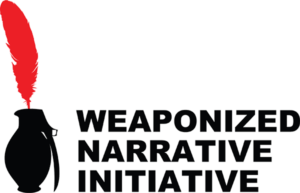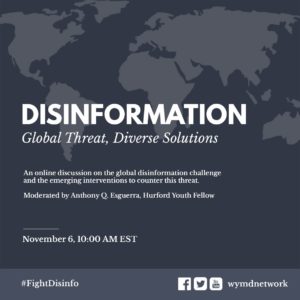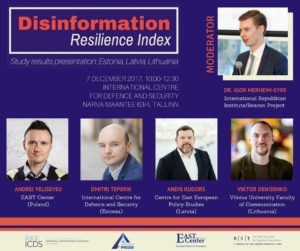
Knight Commission on Trust, Media and Democracy.
How to restore trust in democracy and the media that serve it and us? More specifically, what can leaders, media and citizens do to better understand the “other,” to distinguish between truth and disinformation and to govern ourselves fairly and effectively? These are some of the questions addressed by a new report from the Knight Commission on Trust, Media and Democracy.
Democracy cannot function properly without strong, independent, trustworthy media, notes the commission, which has sought to explore the reasons for the decline in trust and seek solutions to the democratic malaise.
 Now the Commission — a group of 27 diverse individuals [including Stanford University’s Francis Fukuyama, a National Endowment for Democracy board member] convened by the Aspen Institute Communications and Society Program with support from the John S. and James L. Knight Foundation — has published Crisis in Democracy: Renewing Trust in America. The report proposes a range of measures news groups, technology firms, and individual citizens can adopt to rebuild the trust in media that underpins a vibrant democracy.
Now the Commission — a group of 27 diverse individuals [including Stanford University’s Francis Fukuyama, a National Endowment for Democracy board member] convened by the Aspen Institute Communications and Society Program with support from the John S. and James L. Knight Foundation — has published Crisis in Democracy: Renewing Trust in America. The report proposes a range of measures news groups, technology firms, and individual citizens can adopt to rebuild the trust in media that underpins a vibrant democracy.
Reasons for the loss of trust in democratic governance include:
- Poor institutional performance
- Large-scale global “shocks”
- Political polarization
- Increasing economic inequality
- Decreasing economic mobility
 Misinformation and disinformation are spreading virally, sometimes by innocent sharing, sometimes with malice, the report notes:
Misinformation and disinformation are spreading virally, sometimes by innocent sharing, sometimes with malice, the report notes:
- A “post-truth” politics is incompatible with a functioning democracy and is a fundamental attack on our ability to self-govern.
- Online social networks have been used for covert disinformation campaigns, leveraging targeted ad platforms and algorithms that promote engagement based on emotion.
- Social media has provided new channels for the dissemination of both information and disinformation, renewed connections and bullying, political fundraising and intentional misrepresentations.
Reasons for the decline in the public’s trust in the media include:
- Proliferation of news sources
- Media disintermediation
- Confusion between news and opinion
- Spread of misinformation and disinformation
- Decline of local news
- Politicized criticism of the media
 In a 2017 report prepared for the European Council, Claire Wardle and Hossein Derakhshan of First Draft News identified different types of mis- and disinformation, ranging from relatively harmless satire to more serious imposter content and fabricated content. They divide problematic information into two categories:
In a 2017 report prepared for the European Council, Claire Wardle and Hossein Derakhshan of First Draft News identified different types of mis- and disinformation, ranging from relatively harmless satire to more serious imposter content and fabricated content. They divide problematic information into two categories:
- Misinformation, when false information is shared, but no harm is meant
- Disinformation, when false information is knowingly shared to cause harm.
They identified a third category as well: malinformation, when genuine information is shared to cause harm, often by moving information designed to stay private into the public sphere, but the Commission’s primary concern is with disinformation.
The report’s recommendations include:
 Use technology to combat disinformation. To remain relevant, the media must learn to use advanced technology in all aspects of their businesses. Some of the larger entities are leading this effort, but many more need to catch up. In particular, the Commission urges media and technology companies to improve technologies to determine and then address disinformation. The media should also expose their audiences to diverse viewpoints, understanding the tendency of new media environments to create and amplify “filter bubbles” in which people tend to view only material that already supports their opinions.
Use technology to combat disinformation. To remain relevant, the media must learn to use advanced technology in all aspects of their businesses. Some of the larger entities are leading this effort, but many more need to catch up. In particular, the Commission urges media and technology companies to improve technologies to determine and then address disinformation. The media should also expose their audiences to diverse viewpoints, understanding the tendency of new media environments to create and amplify “filter bubbles” in which people tend to view only material that already supports their opinions. Empower people to make technology work for them. The Commission recommends that researchers develop ways to measure healthy dialogue online. These include creating metrics to help analyze balanced, democratic discourse. It recommends that internet platforms provide people with information about how algorithms work that determine which information they see, as well as opportunities to customize them. It also recommends enabling people to move their data from one social network to another. And it proposes a multi-stakeholder forum for technology, journalism and consumer interests to work out solutions to a variety of issues that arise in this space.
Empower people to make technology work for them. The Commission recommends that researchers develop ways to measure healthy dialogue online. These include creating metrics to help analyze balanced, democratic discourse. It recommends that internet platforms provide people with information about how algorithms work that determine which information they see, as well as opportunities to customize them. It also recommends enabling people to move their data from one social network to another. And it proposes a multi-stakeholder forum for technology, journalism and consumer interests to work out solutions to a variety of issues that arise in this space.- Provide students of all ages with basic civic education and the skills to navigate online safely and responsibly. Too many Americans lack an understanding of basic elements of their government and governing principles. Before they graduate from high school, all students should be able to pass the U.S. citizenship exam or a civic knowledge test. Furthermore, individuals who lack digital literacy skills are less able to assess the reliability of information sources in order to tell fact from fiction. …







